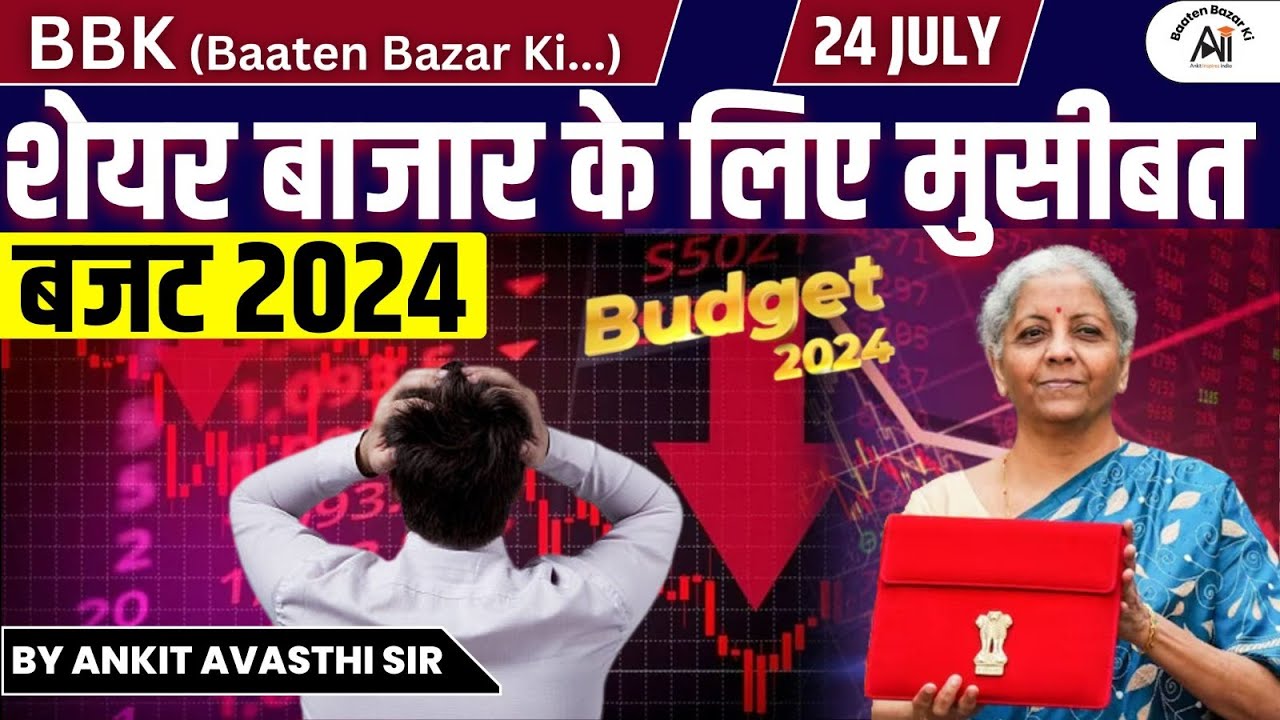High taxes everywhere: where to invest post BUDGET? Macroeconomics | Akshat Shrivastava
Summary
TLDRIn this video, Akshat Srivastava discusses the impact of recent budget changes on investment strategies. He outlines six to seven points to adapt his investing style, including shifts in gold, stocks, and real estate investments. He emphasizes the importance of long-term investing due to increased short-term capital gains tax, and the need to focus on assets with potential for appreciation. Akshat also highlights the significance of understanding macroeconomics and segmental inflation for informed investment decisions.
Takeaways
- 📈 The recent budget changes have a significant impact on investment strategies, pushing towards long-term investing over short-term gains.
- 🏦 Akshat Srivastava, an investor and hedge fund practitioner, emphasizes the importance of understanding macroeconomics for informed investing.
- 📊 Tax rates for short-term capital gains (STCG) on listed stocks have increased from 15% to 20%, affecting profit margins and investment decisions.
- 💼 The speaker suggests focusing on long-term investments in assets like stocks and real estate, given the new tax implications.
- 📉 The reduction of customs duty on gold from 15% to 6% by the government is aimed at lowering the price of gold, impacting sovereign gold bond holders negatively.
- 🏠 The withdrawal of indexation benefits and changes in long-term capital gains tax (LTCG) for real estate suggest a shift towards property trading rather than long-term holding.
- 💡 Investors are advised to consider tradable properties that can add value and be flipped within two years to benefit from the reduced LTCG tax rate.
- 🌐 International diversification is recommended for investors with significant wealth to protect against currency devaluation and to seek better investment opportunities.
- 🔑 The importance of investing in unlisted companies before their IPO is highlighted as a potential source of high returns.
- 💼 The speaker shares his personal investment philosophy, which includes a preference for contrarian investing and value addition in properties.
- 📚 Akshat offers courses for those interested in learning about stock markets and real estate investing in a structured manner.
Q & A
What is the main focus of Akshat Srivastava's video?
-The main focus of the video is to explain the changes in the budget and how they impact investment strategies, including the author's personal adjustments to his investing style across different asset classes like gold, stocks, and real estate.
What does Akshat Srivastava suggest about short-term capital gains (STCG) on listed stocks?
-Akshat Srivastava suggests that the STCG tax rate has increased from 15% to 20%, which is a 25% change in profit margins, indicating that short-term stock investing is less attractive and pushing investors towards long-term investments.
What is the change in the long-term capital gains (LTCG) tax for gold according to the budget?
-The LTCG tax for gold has been changed from a slab rate to a flat 12.5%, which may affect the attractiveness of gold as an investment option.
Why does Akshat Srivastava recommend long-term investing over short-term trading?
-Akshat Srivastava recommends long-term investing because the new tax rates make short-term trading less profitable, and long-term investments are generally more aligned with the current economic policies and tax structure.
What does 'segmental inflation' refer to in the context of the video?
-Segmental inflation refers to the different rates of inflation experienced by different segments of the population, such as those living in cities versus rural areas, which can affect the real value of investments and savings.
How does the change in indexation benefits affect real estate investment?
-The withdrawal of indexation benefits means that the cost of inflation is no longer considered when calculating capital gains on real estate, potentially making long-term holding of properties less attractive from a tax perspective.
What is Akshat Srivastava's view on investing in gold?
-Akshat Srivastava suggests that if one has to invest in gold, it should be in physical form due to issues with purity and quality control in India. However, he personally does not invest much in gold as he has other hedges like bitcoin and real estate.
What are 'tradable properties' as mentioned by Akshat Srivastava?
-Tradable properties are those that can be bought, improved, and sold within a short period to take advantage of the reduced LTCG tax rate of 12.5%. Examples include properties that have been renovated or converted into income-generating assets like Airbnb listings.
How does the budget impact investment in unlisted companies?
-The budget does not directly impact unlisted companies, but Akshat Srivastava suggests that there may be opportunities for significant returns in pre-IPO markets, as private company wealth is often realized through public listings.
What is Akshat Srivastava's stance on international investing?
-Akshat Srivastava sees international investing as a valuable strategy, especially for those with significant wealth, to protect against currency devaluation and to take advantage of market opportunities in other countries.
Outlines

This section is available to paid users only. Please upgrade to access this part.
Upgrade NowMindmap

This section is available to paid users only. Please upgrade to access this part.
Upgrade NowKeywords

This section is available to paid users only. Please upgrade to access this part.
Upgrade NowHighlights

This section is available to paid users only. Please upgrade to access this part.
Upgrade NowTranscripts

This section is available to paid users only. Please upgrade to access this part.
Upgrade NowBrowse More Related Video

These 5 stocks are in strong momentum. Good time to add?

SHARE MARKET के लिए मुसीबत..BUDGET 2024...Explained by Ankit Avasthi Sir

A VERDADE SOBRE INVESTIR EM VALE3

UK budget Hammers Small Businesses. How To Survive Rachel's Tax Raid !

MF Corner LIVE | SEBI Allows MFs To Invest In Overseas Funds With Exposure To Indian Securities

6 Stocks to Bulk Buy or SIP | Akshat Shrivastava
5.0 / 5 (0 votes)